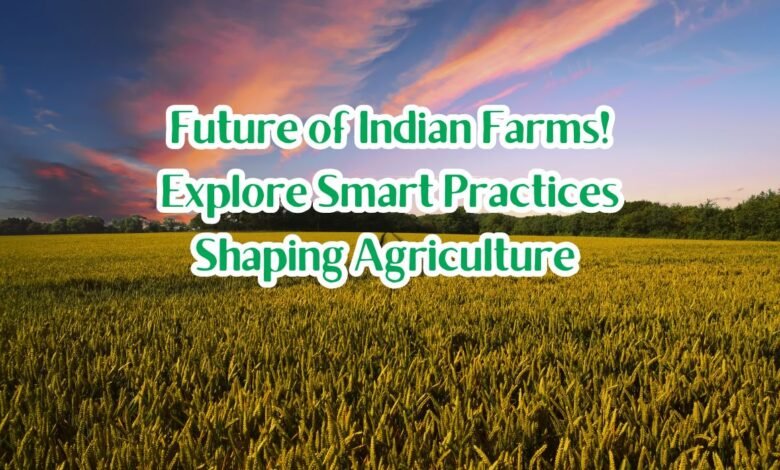India’s agricultural revolution: Shaping the future through innovative farming practices
India’s agricultural revolution: Discover how innovative farming practices are shaping the future of agriculture in India.

India’s agricultural revolution stands as a pivotal chapter in the nation’s economic development, significantly shaping its socio-economic fabric. Historically, the Green Revolution of the 1960s marked the beginning of this transformative journey. This period saw the introduction of high-yielding variety seeds, enhanced irrigation techniques, and the extensive use of fertilizers and pesticides. As a result, India transitioned from a food-deficient country to one of the largest food grain producers globally, ensuring food security and improving livelihoods.
Nevertheless, the agricultural landscape has evolved, and new challenges have emerged. Climate change, population growth, and the necessity for sustainable farming practices present significant obstacles that require innovative solutions. The impact of climate change, for instance, has led to unpredictable weather patterns, adversely affecting crop yields and agricultural productivity. Population growth exerts additional pressure on food resources, necessitating a shift towards more efficient and resilient farming methods.
Modern innovations in agriculture, therefore, are critical to addressing these challenges. Advances in technology, such as precision farming, drone surveillance, and genetically modified crops, are at the forefront of this new wave of agricultural revolution. These innovations aim to optimize resource use, enhance crop resilience, and improve overall productivity, thereby ensuring that the agricultural sector can meet the growing demands of the population while maintaining environmental sustainability.
In essence, India’s agricultural revolution is an ongoing process that builds upon the historical successes of the Green Revolution while integrating contemporary technological advancements. The focus now is on creating a sustainable and resilient agricultural system that can adapt to the changing environmental and economic conditions, ensuring food security and prosperity for future generations.“`
Innovative Farming Practices in India
India’s agricultural revolution is being significantly driven by the adoption of innovative farming practices, which are reshaping the landscape of farming in the country. These practices are at the forefront of improving yields, reducing costs, and promoting sustainability. Several key methodologies are gaining traction amongst Indian farmers, contributing to a more efficient and productive agricultural sector.
Precision Farming
Precision farming is a technology-driven approach that utilizes data analytics, GPS, and IoT devices to optimize field-level management with regard to crop farming. Farmers in Punjab have successfully employed precision farming techniques, resulting in a 20% increase in wheat yields while reducing water usage by 30%. This method ensures the optimal use of resources, leading to cost efficiency and enhanced productivity.
Organic Farming
Organic farming is gaining popularity as it promotes the use of natural fertilizers and pesticides, ensuring healthier produce and soil. Sikkim has become India’s first fully organic state, setting a benchmark for others. The state’s farmers have reported a 15% increase in income due to the premium prices organic products fetch in the market. This transition not only benefits the environment but also improves the livelihoods of the farming community.
Vertical Farming
Vertical farming is an innovative solution to land scarcity and urban farming. This practice involves growing crops in stacked layers, often incorporating controlled-environment agriculture technology. In cities like Bangalore, startups like UrbanKisaan are pioneering vertical farming, producing pesticide-free vegetables in urban settings. This method reduces transportation costs and ensures fresh produce is available year-round.
Drone Technology
The use of drones in agriculture is revolutionizing farming practices by providing real-time data on crop health, soil conditions, and pest infestations. In Maharashtra, drones are being used to spray pesticides and fertilizers more efficiently, reducing the amount of chemicals needed and minimizing environmental impact. Additionally, drones help monitor large areas quickly, saving time and labor costs.
These innovative practices are testament to the evolving agricultural landscape in India. By embracing technology and sustainable methods, Indian farmers are not only enhancing their productivity but also contributing to a more sustainable future for agriculture.
Benefits and Challenges of Modern Farming Techniques
Modern farming techniques have revolutionized agriculture in India, bringing numerous benefits that enhance productivity, resource management, and environmental sustainability. One of the most significant advantages is the increase in crop yields. Precision agriculture, for example, utilizes data analytics and GPS technology to optimize planting, watering, and harvesting processes, resulting in higher productivity per acre. This boost in efficiency feeds into better resource management, as farmers can now make informed decisions regarding the use of water, fertilizers, and pesticides, reducing waste and cutting costs.
Environmental conservation is another critical benefit. Techniques such as drip irrigation and the use of organic fertilizers minimize the ecological footprint of farming. Drip irrigation, for instance, conserves water by delivering it directly to the plant roots, reducing evaporation and runoff. Similarly, organic fertilizers improve soil health over time, promoting sustainable farming practices that benefit future generations.
However, the adoption of modern farming techniques is not without its challenges. The high cost of advanced technology can be prohibitive for many farmers, especially smallholders. Equipment like drones, sensors, and automated machinery requires a significant initial investment, which is often out of reach for the average farmer. Furthermore, a lack of training and technical know-how can impede the effective utilization of these technologies. Many farmers need comprehensive training programs to understand and implement these modern methods effectively.
Infrastructural issues also pose significant barriers. Poor road connectivity, unreliable electricity supply, and inadequate storage facilities can undermine the benefits of modern farming practices. These challenges necessitate a holistic approach, wherein government policies and private sector initiatives work in tandem to support farmers in overcoming these obstacles.
Pros and Cons of modern farming techniques:
| Pros | Cons |
|---|---|
| Increased productivity | High cost of technology |
| Better resource management | Lack of training |
| Environmental conservation | Infrastructural issues |
Future of Agricultural revolution in India
The future of agriculture in India holds immense potential, driven by continued innovation and forward-thinking strategies. As the backbone of the Indian economy, the agricultural sector is experiencing a transformation fueled by government policies and initiatives aimed at fostering growth and sustainability. The government has been proactive in implementing schemes like the Pradhan Mantri Kisan Samman Nidhi (PM-KISAN), which provides financial support to farmers, and the Pradhan Mantri Fasal Bima Yojana (PMFBY), which offers crop insurance to safeguard against potential losses.
Alongside these initiatives, there is a significant emphasis on research and development (R&D) to introduce advanced farming techniques. Institutions such as the Indian Council of Agricultural Research (ICAR) and various agricultural universities are pioneering efforts in developing high-yield crop varieties, climate-resilient farming practices, and precision agriculture technologies. These advancements are crucial in addressing the challenges posed by climate change and increasing population demands.
Education and awareness among farmers regarding new technologies are equally essential. Extension services and training programs are being organized to disseminate knowledge about modern farming methods, efficient irrigation systems, and the use of agricultural drones for monitoring crop health. Digital platforms and mobile applications are also playing a vital role in providing real-time information on weather conditions, market prices, and best farming practices, thus empowering farmers to make informed decisions.
The integration of innovative farming practices is poised to ensure food security and promote sustainable agricultural growth in India. With a collaborative approach involving government support, R&D initiatives, and farmer education, the agricultural sector is set to thrive. The future of agriculture in India looks promising, with the potential to not only meet domestic food requirements but also position the country as a leading player in the global agricultural market.
- Harnessing the Power of AI: How Artificial Intelligence is Transforming Businesses
- India’s IndiGo testing software, in-flight messages for passenger safety
- The Future of Work is Now: Embracing Remote Work and Hybrid Models
FAQ on India’s Agricultural Revolution
General
What are some of the challenges facing Indian agriculture?
Issues like water scarcity, soil degradation, and limited resources are some challenges.
What is the role of innovation in addressing these challenges?
Innovative practices can improve efficiency, sustainability, and farmer livelihoods.
What are some examples of innovative farming practices in India?
Precision agriculture, vertical farming, and use of drones are some examples.
Technology and Practices
How is precision agriculture transforming Indian farms?
Precision agriculture uses data and technology for targeted resource use, maximizing yield.
What are the benefits of vertical farming in India?
Vertical farming allows cultivation in urban areas, saving land and water.
How are drones being used in Indian agriculture?
Drones can be used for monitoring crops, spraying pesticides, and improving irrigation.
Impact and Future
How is this agricultural revolution impacting Indian farmers?
Innovation can empower farmers, increase incomes, and improve food security.
What are the future prospects for innovative farming practices in India?
Continued innovation holds the key to sustainable agriculture and feeding a growing population.



